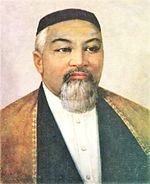Portal:Kazakhstan
Қазақстан порталына қош келдіңіз!!
Kazakhstan, also spelled Kazakstan (Kazakh: Қазақстан, Qazaqstan, IPA [qɑzɑqˈstɑn]; Russian: Казахстан, Kazakhstán, IPA [kəzʌxˈstan]), officially the Republic of Kazakhstan, is a country that stretches over a vast expanse of northern and central Eurasia. Its territory of 2 717 300 km² (bigger than Western Europe) is partially located to the west of the Ural River in eastern-most Europe. It has borders with Russia, the People's Republic of China, and the Central Asian countries Kyrgyzstan, Uzbekistan and Turkmenistan, and has a coastline on the Caspian Sea. Prior to full independence, Kazakhstan existed as the Kazakh SSR republic in the Soviet Union. It is now a member of the Commonwealth of Independent States. Kazakhstan is the ninth-largest country in the world by area, but it is only the 62nd country in population with less than 6 people per square kilometre (15 per sq. mi.). The population is estimated at 17,948,816 (JULY 2014)[1], up from 16,464,464 in 1989 due to relatively high fertility rate, despite substantial emigration of ethnic Russians and Volga Germans. Much of the country's land consists of semi-desert (steppe) terrain.Template:/box-footer Template:/box-header The Kengir uprising was a prisoner uprising that took place in the Soviet prison labor camp Kengir in May and June 1954. Its duration and intensity distinguished it from other Gulag uprisings in the same period (see Vorkuta uprising). After the murder of some of their fellow prisoners by guards, Kengir inmates launched a rebellion and seized the entire camp compound, holding it for weeks and creating a period of freedom for themselves unique in the history of the Gulag. Following a rare alliance between the criminals and political prisoners, the prisoners succeeded in forcing the guards and camp administration to flee the camp and effectively quarantine it from the outside. The prisoners thereafter set up intricate defenses to prevent the incursion of the authorities into their newly won territory. This situation lasted for an unprecedented length of time and gave rise to a panoply of colourful and novel activity, including the democratic formation of a provisional government by the prisoners, prisoner marriages, the creation of indigenous religious ceremonies, a brief flowering of art and culture, and the waging of a large, relatively complex propaganda campaign against the erstwhile authorities. Template:/box-footerAbay Ibrahim Qunanbayuli (Kazak: Абай (Ибраһим) Құнанбайұлы, Russian: Абай Ибрагим Кунанбаев.) (August 10, 1845 - July 5, 1904) was a Kazakh poet, composer, and philosopher. He was also a cultural reformer toward European and Russian cultures on the basis of enlightened liberal Islam. His father's economic status enabled the boy to attend a Russian school in his youth, but only after he had already spent some years studying at a madrash under Mullah Ahmet Ryza. At his school in Semipalatinsk, Abai encountered the writings of Mikhail Lermontov and Aleksandr Pushkin. Abay's main contribution to Kazakh culture and folklore lies in his poetry, which expresses great nationalism and grew out of Kazakh folk culture.
Template:/box-footer
If you are new to Wikipedia or this portal please read the Be Bold ... but not reckless Wikipedia guideline. Please announce new articles here: new article announcement board
The following Wikimedia sister projects provide more on this subject:
|
|||||
- ↑ Lua error in package.lua at line 80: module 'strict' not found.






